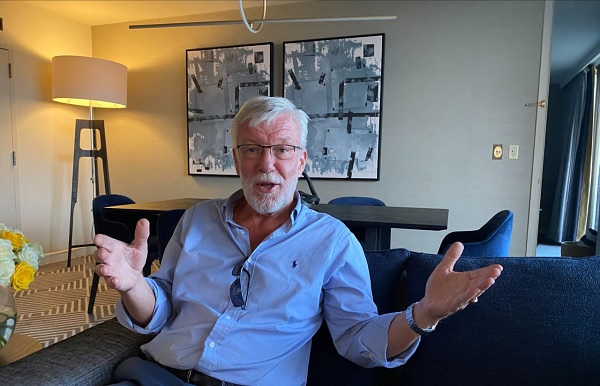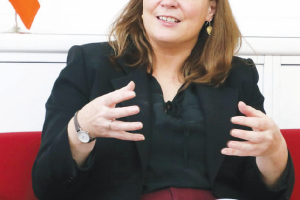
Today’s guest, Oyvind Aadland (PhD), is a Norwegian who has been in Ethiopia for over 60 years, arriving during the reign of Emperor Haileselassie I. He has lived through the Derg era, the revolutionary period, and the EPRDF’s regime, and the incumbent, giving him a unique perspective over the years. Aadland considers himself half Ethiopian due to his deep emotional attachment to the country, its beauty, and its resources. He ponders when unity in diversity can lead Ethiopia to flourish peacefully.
Having lived in Ethiopia since the age of 8, Aadland’s father played a role in enhancing education structures in southern Ethiopia. The Norwegian people gifted a regional hospital in Yirgalem to the Ethiopian people, and through the Ethiopian Evangelical Church Mekane Yesus, Norwegians established structures in education, health, and rural development programs.
Aadland’s interest in living in Ethiopia for the past 60 years stems from his attachment to the language, culture, and people, which make him feel at home in the country. His academic pursuits in theology, communication/journalism and cross-cultural communication led him to obtain a PhD from Northwestern University. Now, Aadland is the owner of a consulting firm, which he used to provide education, research, and consulting services.
The Ethiopian Herald interviewed him on a range of issues, including the concept of nation-building, responsible journalism, national dialogue, and tourism potential in Ethiopia. Have a nice read!
How do you explain the concept of nation-building in general and how a given country can be built?
Well, in a country like Ethiopia, which is composed of people from diverse cultural backgrounds and ethnicities, creating a sense of belonging to one nation is quite challenging. There is a concept of nation-building that scholars worldwide have studied, suggested, and analyzed for how to build a nation.
The concept itself is not controversial, but the how part might be. Taking that into account, two of my Ethiopian friends and I designed a project to bring policy makers, scholars, civil society, other stakeholders… etc. together and hold discussion on this important agenda: nation-building. We invited scholars from Africa and beyond to share various approaches to nation building, past successes and failures in other countries and various ways of implementing it in the Ethiopian context. We held symposia in Ethiopia, USA and the Netherlands.
After a three-year process, we documented our findings in a proceeding and policy document and submitted them to various offices and libraries. One cannot simply impose ideas from one context to another without considering its unique situations and complexities. Adapting the concept to Ethiopia is challenging and requires contributions from various segments of society, including religious, political, and cultural groups.
This process demands time, professionalism, research, and knowledge to avoid imposing foreign ideas that may not fit the Ethiopian context. While certain guiding principles can be universally applied, their applications may not be. It was for this reason that Ethiopians took the ownership of the process.
Recently, International Press Freedom Day was marked. How do you relate the concepts of press freedom and responsible journalism?
As we celebrate International Press Freedom Day, understanding and implementing press freedom throughout Africa is crucial. Press freedom is a fundamental human right that requires professionalism.
Press freedom remains inadequately enforced globally, extending to Africa. Regression in press freedom is observable in various regions, not limited to a single continent.
As we know freedom of expression is a fundamental human right that requires professionalism. I recall attending a human rights conference during the former PM Meles`s tenure, where many individuals were involved in the program and panel discussions on human rights.
As Europeans, we see freedom of expression as critically important. I was at the conference with the Norwegian Ombudsman, and we were uncertain about the conclusions and content of the event. We decided to take a step back and carefully consider how we could contribute to promoting professional freedom of expression and press freedom in Ethiopia.
Personally, along with some Ethiopian friends, we sought funding from NORAD, the Norwegian governmental aid organization, to establish a School of Journalism and Communication at Addis Ababa University. Our goal was to nurture professional journalism that seeks the truth based on facts, as professionalism is essential for upholding the principles of journalism and freedom of expression.
This initiative aimed to nurture professional journalists who seek the truth based on knowledge. By engaging with international media professionals, we provided students with valuable insights and workshops to promote press freedom and democracy in Ethiopia. I am grateful, humble, and proud that we were able to establish the program.
The first cohort of students was taught by lecturers from prominent media organizations such as the BBC, as well as leading universities around the world. These leading scholars and practitioners conducted lectures, symposia, and workshops at the university.
Our aim was to gradually transition to Ethiopian staff and faculty. To this end, some Ethiopians were sent abroad to study their graduate degrees. I am unsure of the current status of the graduate program at the School of Journalism and Communication, but it was launched to enhance professional journalism and to promote press freedom and democracy in Ethiopia through professional and ethical journalism.
Regarding responsible journalism and press freedom, it’s essential to balance legal and moral values. Freedom of expression must be upheld professionally to combat fake news and misinformation.
Protecting freedom of expression, as outlined in the Declaration of Human Rights, is crucial to promoting democracy and human rights globally. While challenges exist, nurturing professional journalism and press freedom can contribute to a more informed and democratic society.
As a foreigner who has lived in Ethiopia for six decades, you are likely to have a good knowledge about the country’s tourism potential. What do you commend for international tourists?
As someone who has led study tours in Ethiopia, I highly recommend exploring the country’s rich history, diverse culture, and natural beauty.
I have been on nearly 10 study tours with Norwegian students to Ethiopia. Ethiopia is a fantastic country to expose students to. We have traveled through its history, starting in Aksum, then moving on to Lalibela, Bahir Dar, and Gondar and further on to southern Ethiopia as well. The historical backgrounds differ greatly between the north and south, and so does the demography and landscapes, from the Simian Mountains to the Boran in the south, the savannah, and the lush greenery of Sidama and Gedeo.
Diving into the depths of Ethiopian culture and history reveals its diversity, and it’s truly amazing.
We also spent time in “contemporary” Addis Ababa, where we studied dances, food, music, and all the vibrant “colors” of a complex nation.
Thus Ethiopia has immense potential for tourism in all aspects. Many of my students have later expressed that their trip to Ethiopia impacted their lives. Some have gone on to work in the Foreign Service and large NGOs, because Ethiopia inspired them. If this potential is utilized effectively, especially with the leading African airline connecting to destinations worldwide, Ethiopia has a bright future. However, it all hinges on peace.
By immersing oneself in Ethiopian culture and history, visitors can appreciate the country’s diversity and potential for tourism. Ethiopia offers a real adventure.
Ethiopia is now engaged in National Dialogue. As a communicator who knows the experience of others, what makes the country effective in the process?
As Ethiopia prepares for a National Dialogue forum, it may be important to revisit the nation-building project’s findings among many other relevant documents. I recommend that our findings from the nation-building project should be revisited and consulted, as the insights and policy recommendations are extremely important. I apologize for sounding like giving advice. Foreign perspectives on Ethiopia must proceed with caution, considering the intricate tapestry of Ethiopian history, culture, and the multitude of ethnicities, alongside the profound challenges it faces. The deeper I delve into Ethiopian anthropology, history and politics, the more I recognize the need for humility in sharing any insights.
Ethiopia needs a real reconciliation that promotes unity in diversity, as there was much bloodshed in the past that has never been reconciled.
I am not sure how to put this, but a contextualized “Truth Commission” may introduce an inclusive reconciliation process beyond the court room, as was the case in the court proceeds following the Derg era.
The focus should be on a process owned by each segment of society, rooted in traditional Ethiopian institutions, which still hold potential. Everyone must contribute to creating a new Ethiopia by looking inward and participating consciously to utilize the country’s resources for a brighter future. With 70% of Ethiopians being young people, it is crucial to activate their potential and involve them in producing products from raw materials for export. A peaceful, hopeful future is needed, and achieving reconciliation, peace, and unity would bring me the greatest satisfaction.
While there are many obstacles, I believe that ownership and contribution from all segments of society are essential to overcome them. It is not just about pointing out what others should do, but about actively participating and contributing to progress.
Traditional Ethiopian institutions can play a vital role in fostering National Dialogue and ownership of the reconciliation process. By engaging all segments of society and focusing on contribution rather than imposition, Ethiopia can build a peaceful and hopeful future for its young population.
Many countries are talking about democracy, but they are not actually implementing it. Where do you think the real place of democracy is?
In terms of democracy and human rights, developing democratic institutions and upholding the rule of law are essential for Ethiopia’s progress. While democratic principles are enshrined in the constitution, their implementation is key to ensuring justice and equality for all citizens.
Democracy must be contextualized and rooted in local institutions to be effective. By drawing upon traditional Ethiopian values and promoting freedom of expression, Ethiopia can strengthen its democratic foundations and empower its people.
What do you wish for Ethiopia to be?
I hope Ethiopia embraces its cultural diversity, empowers its youth, and pursues peace and reconciliation. By leveraging its abundant resources and advancing education and democracy, Ethiopia has potential to shine as a model of progress in Africa. I envision a future where Ethiopians, regardless of their backgrounds collaborate to construct a thriving and cohesive nation.
Thank you very much.
It is my pleasure.
BY GIRMACHEW GASHAW
THE ETHIOPIAN HERALD SATURDAY 15 JUNE 2024





